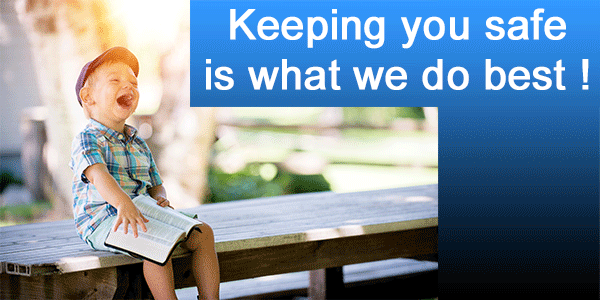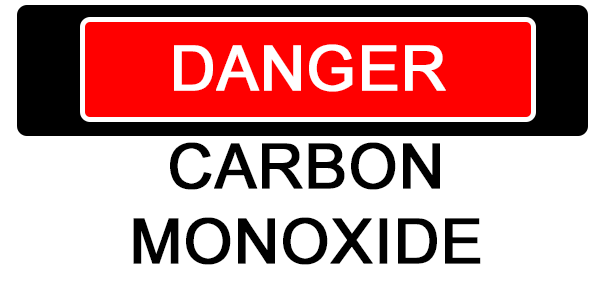Lock up!
Locking your home is such a simple action. It's remarkable how often we forget to do so. An alarming number of break-ins occur simply because a homeowner hasn't locked up. If a break-in occurs and you left your door unlocked, you could have a harder time with an insurance claim. Lock your door behind you whenever you enter and exit the house.
If everyone is inside, and you don't have plans to go out again, lock the door when you’re home too—it’s a good habit to have. Many families simply forget to lock up while they're in their own backyard, or when they go to bed. Every Summer, the Ottawa Police issue warnings to the public about locking up. Even the garage door should be locked when you're not using it. Thieves are opportunists, so don't give them the opportunity!
It is also important that you not forget to lock your windows. If you have basement windows, you might consider putting bars in place for added security.
Test your security system!
This seems simple, but is too often overlooked. People are busy and important details like this can slip your mind. Contact us to set up an appointment to test your system. It's recommended that you test your home security system every few months. At the very least, have it looked at annually. If you know how to successfully test your system yourself, contact the security monitoring station before setting off any alarms, or you could wind up responsible for false alarm fines.
Garage security.
If you’re a homeowner and you have a garage or shed, you should keep them locked at all times, especially if they are connected to your house. If a burglar tries to infiltrate your home and is stopped by locked doors and windows, it’s possible they could find the necessary tools to get the job done in your shed or garage.
Spare key?
Most families keep a spare key at their home in case anyone gets locked out. Where do you keep yours? • Under the doormat • In the bottom of a flowerpot • Under a fake rock
If you chose any of the above options, you need to find a better spot. Those are the most common places people hide spare keys, and the first places an intruder will check. If possible, keep your spare key with a neighbor you can trust. If that’s not an option, get more creative to hide it. Put it somewhere no one will think of, like taped under your barbecue. If that seems too inconvenient, maybe you use your spare key too often! Your goal is to never let anyone see you use that key, and to only use it in emergencies.
Keep up appearances.
When you head out, it's a good habit to leave one indoor and one outdoor light on. It's easy and simple to do, and it is an incredibly effective deterrent for thieves. Some people choose to leave a radio or television set on while they are out.
If you're leaving for longer than the workday or a night out, ask a neighbor to keep an eye on things for you. Have a friend or relative pick up your mail and newspaper, mow your lawn, shovel your driveway, and even adjust drapes and blinds in your home, or turn on a different light occasionally.
When it comes to your home's exterior, keep in mind that leaving valuables such as bicycles or tools in plain sight can be an invitation to thieves. Keeping your yard well-groomed gives the impression that you are home, and that you are a prudent homeowner. Consider whether your neighbors can see your home if there is a fence or hedge around your property. When exterior lights (motion detecting or not) are installed, be sure that they do not create shadows where burglars could hide at night.
Neighbors are allies.
Gone are the days of the neighborhood welcome committee. Years ago, communities were usually more tight-knit than they are today. That shouldn't stop you from introducing yourself to your neighbors. Cultivating a friendly relationship (saying hello when you pick up your mail, lending a cup of sugar when needed) means that your neighbors know who you are, and will more likely keep an eye out for you. The better you know one another, the more likely you are to know when something isn't right. This puts you and your neighbors in a position to help each other out, and builds a foundation for a more secure community.
A few more things.
• Keep 911 and all other emergency numbers by the phone • Keep neighbors phone numbers handy, too • Report suspicious activities in your neighborhood to the police. Consider teaching your children to do the same when they are old enough. • Never open the door to a stranger without having them show some identification, first. • Make sure your children know to say that you are “busy,” and not that your are “away” when they answer the door or the phone to strangers. • If someone comes to your door asking for help, would you call the police, or an ambulance, or a tow company for them before letting them in? Simply knowing that another party is on the way will deter a criminal. If someone insists you not call for assistance, there is probably something wrong.
Carbon Monoxide is the “Silent Killer”
You can't see it or smell it, but it can kill you. What can you do to stay safe? It's no secret that Carbon Monoxide (CO) can be deadly. Hundreds of people—young and old—die of emission poisoning every year. Cars, gas stoves and other fuel-burning appliances are usually the culprit.
The question is, how can you defend yourself against the so called “silent killer”?
Carbon monoxide is produced when fossil fuels like gas, oil, kerosene, wood, or charcoal are burned. Use your fuel burning appliances properly and the amount of carbon monoxide is minimal and not life threatening. Use them improperly or in a state of disrepair and you may be risking your life.
How does carbon monoxide enter the home? 1. A recent report from the United States reports that up to 30% of newly remodeled energy efficient buildings have indoor air quality problems related to carbon monoxide. New homes are constructed to seal in as much heat as possible. While this conserves energy, it limits free air exchange. 2. Carbon monoxide is produced by the incomplete combustion of fuel. Appliances such as water heaters, furnaces, stoves and space heaters that are fueled by natural gas, propane, kerosene or wood emit carbon monoxide. 3. If these appliances are not properly installed, maintained, or used, dangerous carbon monoxide emissions can result.
What are the symptoms of carbon monoxide poisoning?
Carbon monoxide poisoning is difficult to diagnose. The symptoms are similar to illnesses such as the flu or the start of a cold. At low levels, you or our family may experience: • shortness of breath • mild nausea • mild headaches
Extended exposure to mild levels can have serious long term health effects:
• severe headaches • dizziness or faintness • vomiting • mental confusion • nausea • fatigue
Symptoms will often become worse with continued exposure, and may include:
• severe headaches • mental confusion • vomiting • vision and hearing impairment • unconsciousness When carbon monoxide poisoning reaches this final stage, memory loss, permanent brain damage, coma and eventually death can result.
If you experience symptoms that you think could be from carbon monoxide poisoning:
1. Get fresh air. Open doors and windows, turn off combustion appliances and leave the house. 2. Get to a hospital. If carbon monoxide poisoning has occurred, it can be diagnosed by a blood test done soon after exposure. 3. Prepare. Answering these questions will help your physician diagnose you: • Do your symptoms occur only in the house? • Do they disappear or decrease when you leave home and appear when you return? • Is anyone else in your house with similar symptoms? • Do symptoms appear about the same time with everyone else? • Do you use fuel-burning appliances in the home? • have you had these appliances inspected lately? • Are your appliances working properly?
Prevention can keep you alive and well.
1. Inspect it. Have all oil and gas furnaces, gas water heaters, gas ranges and ovens, gas dryers, gas or kerosene space heaters, fireplaces, and wood stoves inspected by a trained professional prior to every winter. Make sure your flues and chimneys are connected, in good condition, and not blocked. 2. According to the instructions…. Choose appliances that vent fumes outside, have them installed professionally, and maintain them to manufacturer instructions. 3. A little goes a long way. Read and follow all instructions that accompany any fuel-burning device. If you can't avoid using an unventilated fuel space heater, carefully follow cautions that come with the device. Use the proper fuel and keep doors to the rest of the house open. Crack a window for ventilation. 4. Don't use a gas oven to heat your home, even for a short time. 5. Of running cars and closed garages… Don't idle your car in a garage, even if the garage door to the outside is open. Fumes build up fast in the garage and in your home. 6. Not even in a fireplace. Don't use a charcoal grill indoors. 7. Curling up with kerosene can kill you. Never sleep in any room with an unventilated gas or kerosene space heater. 8. Do it outside. Use gasoline-powered mowers, weed trimmers, snow blowers, chain saws, small engines or generators where nature intended it, outside. 9. If you feel sick, see your doctor. Don't ignore unusual or flu-like symptoms, particularly if more than one person is feeling them in your house.
Be aware. Be prepared. And stay safe. Safety is a choice.
 Safety Tips
Safety Tips
